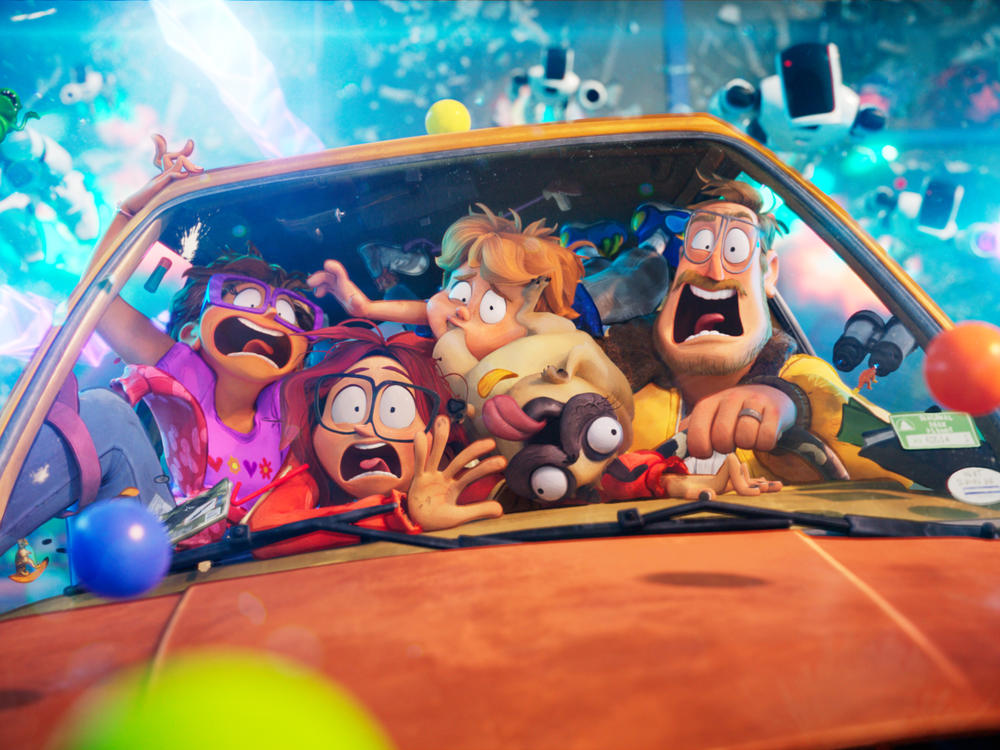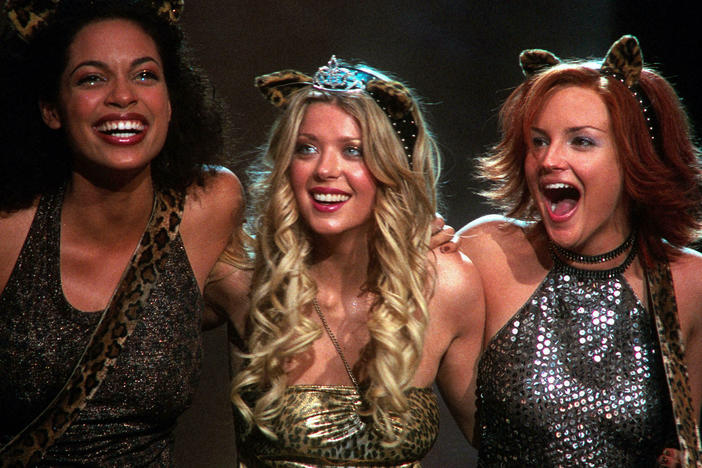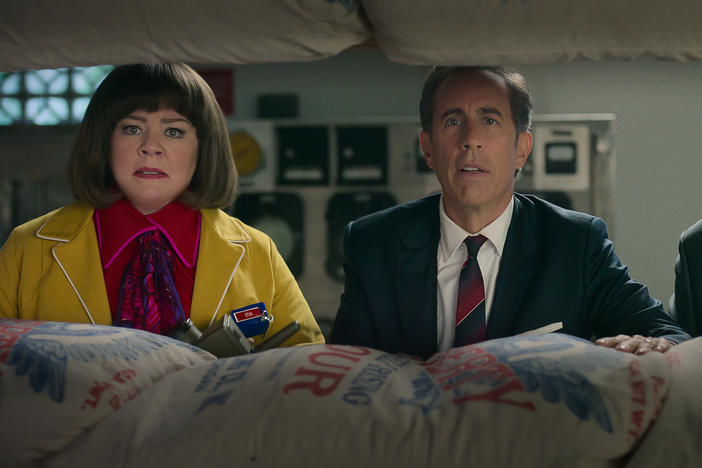Section Branding
Header Content
In 'The Mitchells Vs. The Machines,' A Dysfunctional Family Gets A Hard Reboot
Primary Content
American animated films strive to serve two masters: Kids, who are generally up for anything bright and colorful and noisy, and their harried Adult Caretakers, who just want to plop said kids in front of a piece of entertainment that's bright, colorful and noisy enough to keep them occupied for a couple hours.
Knowing that adults often experience these movies alongside kids, the big producers of US animated films (Disney/Pixar, Dreamworks, Warner Bros. and Sony) attempt to thread the "Fun for the Whole Family!" needle, with mixed results.
The path of least resistance is to sprinkle in just enough jokes aimed at adults to keep them engaged. (Dreamworks historically contents itself with making references aimed at adults, which is a subject for another day.) That "just enough" turns out to be crucial, however: Too many adult jokes, and kids start to grow wary and restless. Worse still, they start to ask any nearby adults questions, which defeats the whole purpose.
The big studios also realize that adults would feel guilty having kids watch an animated film that existed as pure entertainment. Enter: The Life Lesson, which in US animated movies generally devolves to some variation of Believe In Yourself/You Are Special/Never Give Up. (Outside of the US, animated films are permitted to tell stories about and for adults — stories that are nuanced, even challenging, and difficult to reduce to tidy bromides.)
The Netflix animated film The Mitchells vs. The Machines comes out of Sony Animation, and, as expected, it dutifully ticks all the usual big-studio boxes — there's a bright, colorful, noisy story for kids, there are jokes aimed at adults, and there's a life-lesson about loving and accepting one's family, warts and all.
The difference comes in the execution — how the film checks those familiar boxes. The animation is crisp and loaded with physical comedy (the Mitchells' facial expressions and stylized anatomy, the robots' double takes, the family pug's convincingly puglike [lack of] animation).
The joke-density is admirably high, with an impressive hit-to-miss ratio, and is allowed to go a bit dark, especially in the film's funniest set piece, set in an abandoned mall where the Mitchells must defend themselves against malevolent machines.
The jokes in question don't come off like the usual "here's one for you parents out there" elbow-nudging that US animated films default to; they're just solid gags that grow out of the characters. That's no accident: The film's produced by Phil Lord and Christopher Miller, whose animated resume is impressive (Cloudy with a Chance of Meatballs, The Lego Movie, Spider-Man: Into the Spider-Verse). The screenplay's by Mike Rianda and Jeff Rowe, who worked on Gravity Falls together.
And when it comes to the pre-installed life-lesson, even that goes a bit farther than expected. (Ignore the opening monologue, which seems lifted from another, lesser movie, in which teenage Katie [voiced by Abbi Jacobson] describes her family as "weird." Among the evidence she cites as proof: She likes making films on her computer; her little brother [voiced by Rianda] likes ... dinosaurs. Yeah. So weird!)
Katie isn't simply a disaffected teen, a la The Incredibles' sullen Violet. No, she's aching to go away to film school and leave her family behind — her father (voiced by Danny McBride) in particular. Their relationship is more deeply estranged than you're likely expecting; they seem to fundamentally dislike each other. We know of course that they'll come together in the end, but the screenplay doesn't go for a quick fix, instead drawing the entire family into their simmering conflict.
The film doesn't give Katie's mother Linda (voiced by the brilliant Maya Rudolph) nearly enough to do, until suddenly, it does. And it keeps stopping dead in its tracks to revisit the Katie-Dad conflict, hitting the same beats every time. Which is likely one reason The Mitchells vs. The Machines seems to come most fully alive whenever it ditches the Mitchells for the machines, who are led by an evil would-be despot voiced by a performer (no spoilers) who seems to be having a ball. These scenes are filled with smart, savvy jokes rooted in specifics about technophobia, consumerism and corporate greed; that they're as funny as they are without coming off as didactic is a testament to how well matched the material is to the voice cast (which includes Fred Armisen, Beck Bennett and Conan O'Brien).
No one would mistake The Mitchells vs. The Machines for anything other than what it is — the product of a big US animation studio, with all that that implies. But in brief, intriguing flashes, it manages to exude a sensibility that's darker, spikier, and more idiosyncratic than most other animated films you'd plop your kid in front of.
Copyright 2021 NPR. To see more, visit https://www.npr.org.
Bottom Content




